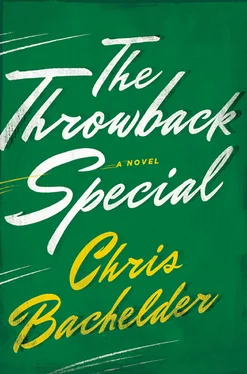•
CARL WASN’T a particularly gifted barber, but he had all of the equipment — the cape, the dull scissors, the electric clippers with a cord that was too short. He had cut hair in college to make money, and for a dozen or so years now he had offered cuts to the men on the afternoon of the Throwback Special. The haircuts were optional, free, and private. Carl’s clippers glistened with golden oil. The men signed up for fifteen-minute appointments, but they all tended to arrive at Carl’s room at the time of the first appointment. The man with the first appointment went in alone, while the others waited in a line in the hallway, seated against the wall in the order of appointment. Some men in the hall had no appointment, and just came for the company. Thus, the ritual was communal, but only in the hallway, where the men laughed and talked, while the clippers buzzed faintly behind the door. Carl had nothing to do with this arrangement. He would have welcomed all of the men in the room together. He would in fact have preferred chatter and merriment and derision to solemnity and isolation, which he found exhausting. But the custom reflected the will of the men, for whom the haircut was as private as a urological exam. The custom arose spontaneously, and it was perpetuated without consideration. A haircut by an acquaintance required submission, and submission required privacy. The man sat, he wore a musty cape, heavy as a welcome mat. Carl sprayed his hair with a water bottle and combed it, humiliatingly, straight forward. There was no mirror. Drops of water ran down the man’s nose. His face itched, but he did not scratch it. His arms were trapped beneath the heavy cape. He was a child again, a boy. His thoughts drifted toward his mother. The standing barber circled his chair, carelessly bumped him, wiped water from his face, hair from his ears. The barber leaned down close, breathing heavily, smelling like a man. His forearms were hairy. The barber talked, or he didn’t. The barber cut the hair however he wanted to cut it, regardless of request or instruction. He moved the man’s head up, down. The barber nicked him — the neck, the tips of the ears — then dabbed the blood roughly with a towel. The man resented this optional experience that he craved. When a man came out of Carl’s room, the other men whistled and made loud noises at him. They made fun of his haircut, made fun of Carl. “What did he do to you?” Then it would grow quiet in the hallway, and the next man would stand and knock gravely on the locked door.
3:00: Peter
Peter’s hair was wavy and wiry. It was brittle and lifeless, like something partially buried in an ancient seabed. It was both thick and thinning. At the crown of his head a turbulent cowlick seemed to be churning toward landfall, forcing evacuation in low-lying areas. Carl had never given Peter the same cut twice, and the sight of the swirling cowlick made him nervous and angry. To cut hair was to love order, but Peter’s scalp was the site of radical turmoil. Not even a skilled barber could have done much with it. The hair, though, was only part of the issue. Peter was, as the ancient barbers whom Carl had worked with in college would have said, a leaker . Some people, almost as soon as you lay that heavy cape across their shoulders and put your hands to their heads, begin to lose the solid self. Peter removed his mouthguard, the emotional levee. He was trying to tell Carl about the children’s choir’s fall concert, and he could not finish. The sound from those rented risers. . Carl was annoyed, but he knew what to do. He had watched the old-timers. He tucked the scissors into his back pocket, and he picked up the spray bottle from the bedside table. He did not move quickly, but neither did he move slowly. With the spray bottle, he sprayed water onto Peter’s head. He sprayed and sprayed, combing forward. He doused Peter’s head until streams of water ran down Peter’s face. Peter knew to keep his hands beneath the cape. Carl sprayed. It was an old trick, a ruthless courtesy.
3:15: Gil
When Peter emerged into the hallway, Gil obligatorily made fun of his haircut, then knocked on the door of Carl’s room. Carl opened the door, and nodded hello. Gil sat down in the chair, located between the two beds. Beneath the chair Carl had spread out four white hotel towels. Both men were mildly embarrassed by the sudden realization that they would face each other that evening in a battle of strength and agility, albeit a ceremonial one with assumed identities and a predetermined outcome. Carl placed the heavy cape on Gil. They both looked straight forward, as if into a mirror. The heating and cooling unit ticked and clanked. Carl winced as he absentmindedly prodded the tender lump with the comb. He gave Gil an opportunity to say what he wanted, but Gil said nothing, so Carl tilted Gil’s head down and began to cut the hair on the back of his head with clippers. The cord of the clippers was a taut line, but it did not pull out of the wall socket. Gil closed his eyes, as if in prayer. The vibration of the clippers felt nice along his cranium. He could hear the men in the hallway, laughing and shouting, passing the long afternoon. Two voices rose above the others. To Gil it sounded as if George and Steven were hashing something out, though he could not discern the subject, nor did he wish to. Their tone and cadence — adversarial, intimate — carried much more meaning than their words, which were probably inane. The loud discussion through a wall, combined perhaps with the weather, made him sleepy and nostalgic. Gil had a long drive the next day. He loved his family, but he didn’t want to go home. He was having fun — though fun may not have been the right word. He was happy here — though happy may not have been the right word.
3:30: Nate
“Is it true about Adam?” Nate asked.
A barber, even one isolated in a hotel room, was expected to know things.
“I don’t know,” Carl said.
From his wallet Nate produced a photograph of his children, posed in an artificial bower. The girl was skinny, with dark circles beneath her eyes, and she clung like a castaway to the gleaming trunk of a synthetic tree.
“Nice,” Carl said.
“Turns out she was allergic to that plastic bark,” Nate said. “She’s allergic to everything, though. When we were kids, Carl — do you remember? — there was one, maybe two allergies.”
“Bees,” Carl said, trimming the hair above Nate’s ear.
“That’s right,” Nate said. He seemed to be making a moral argument. “There was that kid who bragged that he would die if he got stung. Then there was pollen, and maybe cats. And that was it. That was all. And now I’ve got a kid who is allergic to crayons and dust.”
Carl stood and moved behind Nate’s chair. He nodded, though there was no mirror.
“Aren’t we supposed to become better adapted through generations?” Nate said. He sounded troubled. He seemed to be suggesting that children today did not share our values.
Out in the hallway, something or someone slammed hard against the door, and the men laughed and coughed. Then Nate told a story. The story began with a kind of rustling or scuttling sound in the basement. Carl gritted his teeth. God help me, he thought, this is going to be a story about an animal in the house. Carl had been at the hotel for a little more than twenty-four hours, and he had already heard six or seven stories about animals in houses, identical in dramatic contour — the strange noise or scat or smell, the mystery, the false hypothesis, the persistence, the breakthrough, the discovery, the grim and triumphant resolution. The unstated moral: It’s my house . But Carl tried to be patient, he did. He understood that each animal in each house felt unique to the home owner. A man with an animal in his house is an archetype. He joins a long narrative tradition, and yet for each particular man in each particular house the event is not allegory. It is an urgent and singular encounter, exceptional and unrepeatable. Carl remembered very clearly the bats in his own attic. Those terrible little fingers. He knew that each man was entitled to his story about an animal in the house, and he tried to pay attention, tried to nod and sound surprised when it turned out to be a raccoon. “Are you serious?” Carl said. “What did you do then?” Nate had good hair, and it was a pleasure to cut. He had, at least in the decade that Carl had known him, always parted his hair in the middle. It was time, Carl thought, for a change.
Читать дальше












